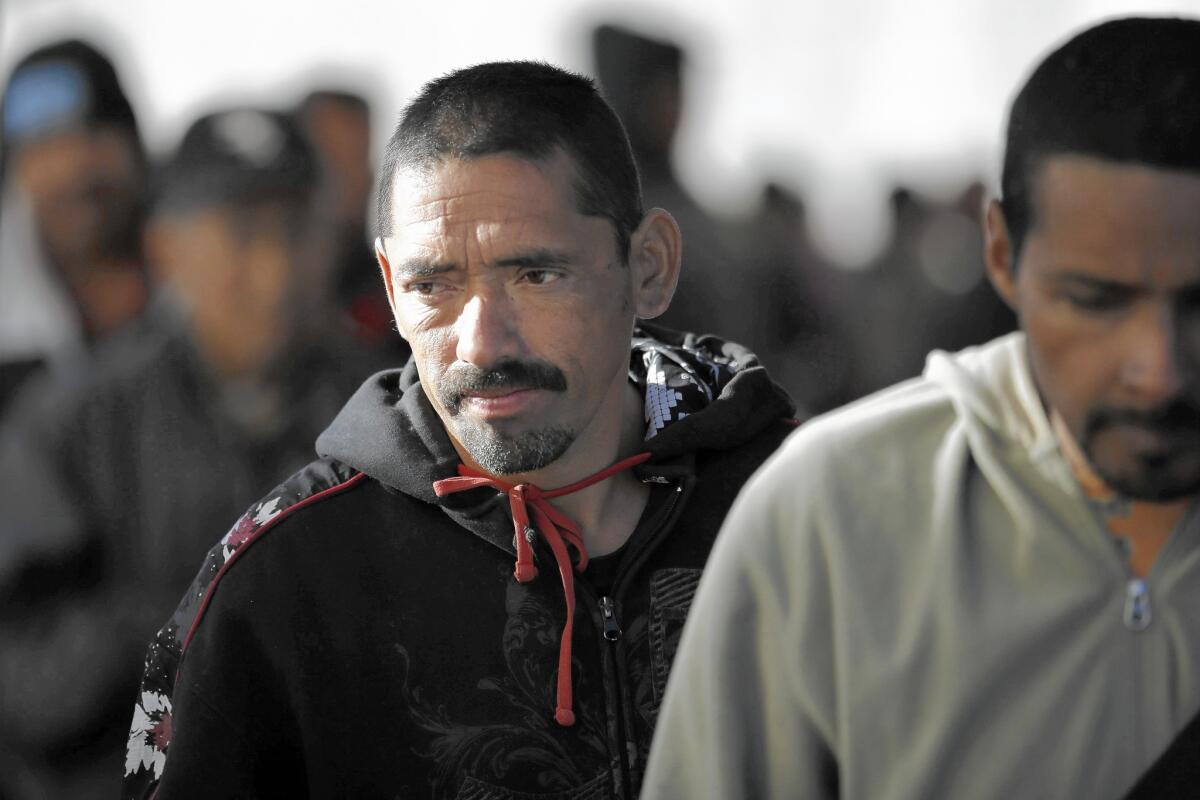Twist of fate excludes many from Obama’s immigration plan

- Share via
Reporting from Mexico City — Enrique Zamora Lara is plain out of luck. In a perfect world, the Guanajuato, Mexico, native would be eligible for the liberating relief that President Obama’s new immigration rules will grant. He lived in the United States for 25 years and fathered three children who are U.S. citizens. He worked hard and never, he says, broke the law.
Except the one about his very presence in the United States.
Last year, Zamora, 50, was detained in a raid by U.S. immigration agents at the Tennessee factory where he worked. After legal actions failed, he was deported to Mexico.
Zamora — along with tens of thousands others deported from the U.S. in just the last couple of years — will not be able to rejoin their families in the United States under the new policy, even though they otherwise meet the qualifications.
The president’s aggressive deportation policies of recent years have had the perhaps unintended consequence of removing many of the same people he now says he intends to help.
“We’ve lost so many people,” said Veronica Isabel Dahlberg, an activist with HOLA, an immigrant-advocate organization in Painesville, Ohio.
Dahlberg has dealt with scores of cases of illegal immigrants who have lived upstanding lives — working, paying taxes, raising kids, meeting mortgages — but then get picked up in surprise raids or when committing minor traffic infractions and are deported. Or, they go back to their native country for a parent’s funeral or important family business and are caught as they try to sneak back over the U.S. border. At that point, they are essentially blacklisted, cases closed, and no longer qualify.
As with Zamora, they leave behind in the U.S. a spouse and children, many of whom are American citizens. Their hope of being reunited with their families are no better now than they were last week.
“I wish what Obama is doing now could have touched me so that I could be with my family,” Zamora said in an interview last week on the margins of a huge demonstration in Mexico City to protest Mexican government corruption.
“My dream is to return to the United States, but I’m now old to be crossing the border” illegally, he said.
In Tennessee, Zamora had a steady job with a decent income and his own home, where he and his wife lived with their three children, U.S. citizens. In Guanajuato, he says, he lives in the home of a sister, and, unable to find permanent work, does low-paying odd plumbing jobs.
“It’s really sad what happened to me,” he said. “I had the bad luck that they nabbed me with a group of Mexicans leaving the factory.
“The tragedy is the pain of my family being left behind. I speak with them almost every day, but it’s not the same. I miss them too much.”
Experts estimate that a quarter of a million foreign nationals may be in the same boat: deported recently but otherwise qualifying for the new policy, which Obama announced as a package of executive actions that will allow millions of immigrants to remain in the U.S. and work legally.
Mexicans and Central Americans account for most of those living in the U.S. illegally. About 55% of the unauthorized Mexicans who are in the U.S., roughly 3.25 million people, could qualify for the new residency and work permission, according to an analysis by the Pew Research Center.
Mexicans would constitute the largest beneficiary group, followed by Central Americans at about 800,000, according to Pew. However, none of the people who have fled raging violence and deepening poverty in countries such as Honduras, Guatemala and El Salvador in the last couple of years will be covered by the new rules, which require applicants to have lived continuously in the U.S. since Jan. 1, 2010.
Mexicans and Central Americans also make up the lion’s share of deportees, many for having committed serious crimes but others for minor offenses or simply for being in the U.S. illegally.
At a shelter for immigrants in Tijuana, Father Pat Murphy said he finds it heart-wrenching that so many migrants will miss the chance of living legally by a twist of fate.
“I’m thinking of the 8,000 [deportees] who passed through here this year,” he said.
Two doors down, at the Casa Madre Assunta shelter for female migrants and children, one resident had been deported two months ago after years in the U.S. Now, the best she could hope for, those in charge at the shelter said, was to make a home in Tijuana (she doesn’t want to return to her native Oaxaca) so her 12-year-old, U.S.-born daughter in California can visit her.
“If what Obama is doing will avoid more cases like mine,” said Zamora, the Guanajuato native, “then that’s very good.”
Sanchez is a news assistant in The Times’ Mexico City bureau.
Times staff writer Joseph Tanfani in Washington contributed to this report.
More to Read
Sign up for Essential California
The most important California stories and recommendations in your inbox every morning.
You may occasionally receive promotional content from the Los Angeles Times.











